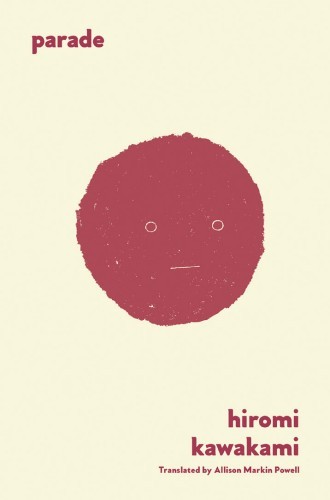
Parade
A Folktale
کتاب های مرتبط
- اطلاعات
- نقد و بررسی
- دیدگاه کاربران
نقد و بررسی

September 2, 2019
A pair of mysterious creatures from Japanese folklore become a young girl’s companions during a trying period in Kawakami’s sweet and original tale (a companion piece to her novel Strange Weather in Tokyo). After a leisurely dinner of somen noodles with her old teacher, Sensei, Tsukiko relates the story of the creatures, called tengu, who began to follow her in childhood. “The tengu had human bodies... long noses, and wings. Their faces were beautiful shades of red, just as depicted in books.” Tsukiko is shocked when the tengu first appear, but her friends and family see nothing amiss: her mother merely greets the tengu, and her third-grade classmates reveal that they’ve long had their own folktale companions, “a badger, a little old lady, and a rokurokubi woman with a very long neck.” Used to and somewhat comforted by the tengu, who drink the nectar of flowers and communicate through “bristling sounds,” Tsukiko is worried when one of them falls ill—an illness that coincides with the mass shunning of her classmate, Yuko: “a cruel game, administered according to sheer whim.” Part fairy tale, in which some readers will discern a moral, part gentle reminiscence of childhood’s passing miracles and memorable pains, Kawakami’s compact novel is gentle, charming and smart, as “pretty... and sad” as the sparkling touches of the tengu.

September 1, 2019
Enigmatic novella in which the world of Japanese mythology intrudes into the mortal realm. Readers familiar with Kawakami (The Ten Loves of Nishino, 2019, etc.) will know her alter ego-ish character Tsukiko Omachi and the one-time high school teacher known only as Sensei, who figure in such recent works as Strange Weather in Tokyo. In an afterword, Kawakami writes, elusively, that "the world that exists behind a story is never fully known, not even to the author." Two worlds, in fact, exist here. The first is Tsukiko's quiet life, which, on this summer day, the air loud with cicadas, is punctuated by a visit from Sensei, who, as ever, is critical: She doesn't know how to make somen noodles, her habit of touching her earlobe is off-putting, she's old enough that the imprint of the tatami mat on her skin doesn't go quickly away after a nap. "That's a rude thing to say," says Tsukiko of Sensei's last jibe, though she complies with his demand to tell him a story. The one she obliges him with is odd: As a child, she says, she was awakened one night by the clamor of two--well, somethings fighting, not animal, not human, but tengu, "the spirit creatures I had seen in folktale books." Others see them, too, but ignore them, even as Tsukiko's mother recounts that in her day it was a fox that followed her around, while some of Tsukiko's classmates have companion ghosts, badgers, and the like. The most understanding of those classmates, a young girl named Yuko, seems sympathetic enough--until, as Tsukiko notes, the tengu touch her, and "when they did so, the spot on Yuko's body where they had touched her would sparkle. Like a nighttime parade." Is Yuko real or another visitor from the spirit world? At once melancholic and joyful, the story satisfies Sensei, the cicadas begin to chirp again, and life goes on, if suffused in strangeness. Like so much of Kawakami's work, an elegant mystery that questions reality in the most ordinary of situations.
COPYRIGHT(2019) Kirkus Reviews, ALL RIGHTS RESERVED.

Starred review from October 1, 2019
The presentation is exquisite: slightly smaller than a single hand, Kawakami's spare text is interrupted by Takako Yoshitomi's delightful two-color illustrations of mostly geometric shapes with anthropomorphized additions. Subtitled A Folktale, this less-than-100 pages tome easily stands alone as a parable about memory, mythic characters, and confessional regrets, but for a lingering, sigh-inducing experience, read this only after finishing its companion, the internationally bestselling, Man Asian Literary Prize finalist, Strange Weather in Tokyo (previously published as The Briefcase, 2012). Kawakami begins, ?Tell me a story from long ago, reintroducing Tokyo's unlikely couple?a septuagenarian-ish retired high-school teacher and his former student Tsukiko, who is some three decades younger. While sharing a leisurely summer afternoon cooking and eating somen (thin wheat noodles), Tsukiko reveals a story from when [she] was little, involving the appearance of two tengu (supernatural winged creatures) companions, elementary school bullying, the saving grace of forgiveness, and the magic engendered by kindness. Kawakami's enduring afterword follows?and haunts?as she ponders what happens to stories that have ended, of echoes that [she] hear[s], far off in the distance, how [t]he world that exists behind a story is never fully known, not even to the author. The result?Anglophoned once again by Powell, Kawakami's translator of choice?is an ethereal, resonating literary gift.(Reprinted with permission of Booklist, copyright 2019, American Library Association.)

























دیدگاه کاربران